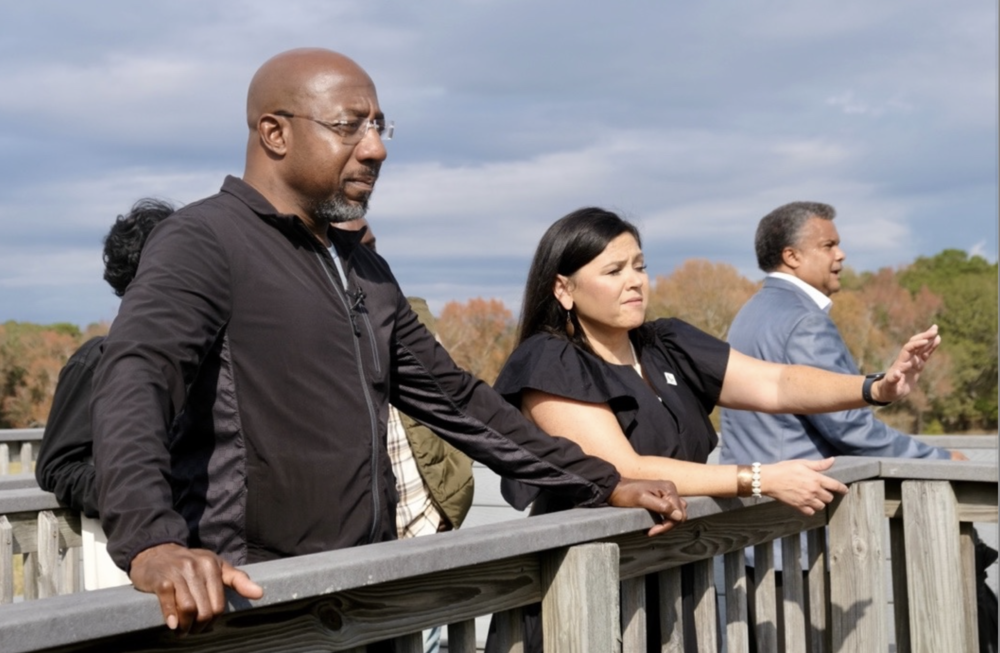
Caption
Tracie Revis, a citizen of the Muscogee Creek Nation, admires the view from the Great Temple Mound complex with Sen. Warnock during his tour of Ocmulgee National Historic Park on Nov. 20, 2023.
Credit: Eliza Moore / GPB
|Updated: November 22, 2023 8:58 AM
As U.S. Sen. Raphael Warnock visited the Ocmulgee National Historic Park on Monday and received a tour of the museum and grounds, he showed his support for the ongoing effort to ensure the Muscogee Creek Nation’s homeland receives federal protection.
“After hiking the grounds and learning more about its history, today, it is clear Ocmulgee is not just an expanse of land, it is a living testament to our intertwined histories,” Warnock said.
Middle Georgians have waited for years for Macon’s Ocmulgee Mounds to officially become Georgia’s first national park and preserve. But despite bipartisan support in Congress, a new report means progress has been slowed once again.
Warnock's visit came after a National Parks Service (NPS) Special Resource Study was released to Congress last week. The long-awaited federal review concluded that the Ocmulgee River Corridor, the 120,000 acres of land between Macon and Hawkinsville, does not yet satisfy all criteria to qualify for a national park and preserve.
According to the National Parks Service, an NPS study evaluates the site using four congressionally established criteria: national significance, suitability, feasibility, and the need for NPS management. All four categories must have positive findings in order for the national park to be established.
While the study found the land along the river to be nationally significant and suitable, it did not fully meet the criteria for feasibility and need for management. This was partly due to the accessed difficulty of acquiring the land because of the large amount of stage-managed lands and private property owners.

Tracie Revis, a citizen of the Muscogee Creek Nation, admires the view from the Great Temple Mound complex with Sen. Warnock during his tour of Ocmulgee National Historic Park on Nov. 20, 2023.
“This represents the latest plateau in our climb to achieve a space that is appropriately designated and sized given its significance,” Warnock said.
U.S. Rep. Sanford Bishop also spoke at the event Monday. According to Bishop, parts of the study are no longer fully accurate, because changes had been made since the report was first created three years ago.
“There are things in that study that we can take and that we can use to make a strong case for the creation of this national park,” Bishop said. “But the fact is that some of those items have already been addressed, and as we move forward with the process that will be brought out before the Natural Resources Committee and, of course, in Congress.”
Despite the report’s mixed results, Warnock remains hopeful.
“I'm proud to support the bipartisan efforts to establish Ocmulgee as Georgia's first National Park and Preserve,” Warnock said. “I look forward to championing continued efforts in Congress to make this a reality for Macon.”
The study was initiated in response to legislation — authored by U.S. Reps. Austin Scott and Bishop, and former U.S. Sens. Johnny Isakson and David Perdue — which was signed into law in 2019.
According to Warnock, the official designation of the park would bring valuable resources and recognition to the area and community.
“Getting this done would be great news for Georgia. We're talking about tourism dollars, we're talking about jobs and the preservation of an important story that needs to be told," Warnock said. "We need to bring our children here.”
The Ocmulgee National Monument was originally authorized by Congress in 1934 to protect 678 acres of land. The land has had 12,000 years of continuous human habitation, and contains a wealth of archeological and historical significance.